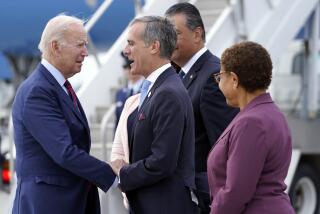Allegations Put Envoy in Diplomatic Jeopardy
- Share via
WASHINGTON — When Peter Galbraith, the flamboyant son of famed economist John Kenneth Galbraith, arrived in the Croatian capital of Zagreb in 1993 as America’s first ambassador to the newly independent country, he quickly established himself as the most popular diplomat in town.
But while he was generating popular acclaim in Zagreb, Galbraith, now 46, was developing a less flattering reputation in Washington. His role in President Clinton’s secret 1994 decision to give a green light to covert Iranian arms shipments to Bosnia, which exploded into controversy when it became public last year, has turned Galbraith into political poison.
Now he desperately wants to counter Republican allegations that he not only participated in the unauthorized covert action, but also lied to Congress about it.
A former high-profile staff member on the Senate Foreign Relations Committee, Galbraith now is waging a campaign to get out from under the Iran-Bosnia controversy and to rescue what was once a promising diplomatic career.
For now, congressional Republican sources said that they believe Iran-Bosnia has made Galbraith “unconfirmable” for another ambassadorial post or any other job requiring Senate approval. Time for Galbraith appears to be running short, with his tenure in Croatia likely to end this summer.
Last year, Galbraith defended his role in the arms-shipments controversy. But his public testimony before Congress did not address many of the most explosive allegations against him, contained in a classified report issued by the Republican majority of the House panel created to investigate the matter.
Galbraith, his State Department supporters and Democrats on the House subcommittee believe that the Republican allegations against him are unfounded. Panel Democrats issued a classified minority report that they said debunks many of the Republican charges.
Indeed, perhaps the most notable aspect of the House investigation is the degree to which partisanship crept into the process, with Republicans and Democrats studying the same facts and coming to diametrically opposed conclusions.
Last November, Republican panel members asked the Justice Department to determine whether criminal charges should be brought against Galbraith, then-National Security Advisor Anthony Lake and other administration officials. The Republicans highlighted conflicting testimony about the instructions given to Galbraith by the National Security Council.
The Justice Department appeared to ignore the referral until it became an issue in Lake’s controversial nomination to head the CIA. Finally, it announced it had cleared Lake of any wrongdoing.
But Justice has not yet ruled on the criminal referral about Galbraith. The referral focused on Galbraith’s testimony that Jenonne Walker, then a senior NSC aide, told him in April 1994 that--if Croatian officials asked about the U.S. attitude toward Iranian arms shipments--he was to respond that he had “no instructions” from Washington.
Galbraith testified that Walker added that “Tony [Lake] was smiling when he said it”--suggesting that the White House wanted Galbraith to make it clear that the United States was giving its sanction to the Iranian arms pipeline.
But Walker denied making that statement, and Lake said he did not ask that his smile, if any, be conveyed to Galbraith.
White House officials and congressional Democrats said they believe the contradictions are the result of faulty memories but Republicans said that they are evidence of an effort to conceal the truth about Galbraith’s instructions.
House Republicans also raised questions about whether Galbraith actively facilitated the creation of an Iranian arms pipeline through Croatia and into Bosnia.
Among the most serious charges was a report that in early 1994 Galbraith met in Zagreb with an Islamic religious leader who became a middleman between Iran and Croatia in the arms-smuggling operation. U.S. intelligence subsequently reported that the cleric, Sevko Omerbasic, told the Iranian ambassador to Croatia that two U.S. officials had come to see him and had encouraged him to try to acquire arms for Bosnia by any available means.
When the CIA told Galbraith this, Galbraith said that he had met with Omerbasic but denied ever saying anything about arms for Bosnia.
Panel Democrats dismissed the GOP allegation that Galbraith conspired with Omerbasic to help set up the arms pipeline and congressional Democrats and State Department officials now say they believe that Omerbasic lied to the Iranian ambassador.
Galbraith has told State Department colleagues--and has testified in classified briefings--that he met with Omerbasic only once. U.S. Embassy official Tom Mittnacht, who accompanied Galbraith to the meeting, also testified that there was no discussion of arms.
Republicans also charged that Galbraith may have pressured Croatian officials in September 1995 to deliver a shipment of Iranian missiles to Bosnia.
Congressional Democrats and Galbraith’s other supporters said there is no evidence to support that charge, and note that the Croatian official did not make the allegation until the spring of 1996, after The Times had first broken the story of Clinton’s green-light policy and Congress was beginning to investigate.
More to Read
Sign up for Essential California
The most important California stories and recommendations in your inbox every morning.
You may occasionally receive promotional content from the Los Angeles Times.













